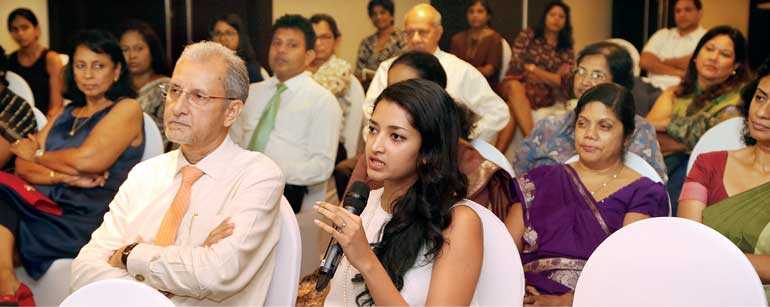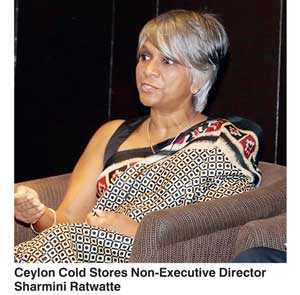Wednesday Feb 18, 2026
Wednesday Feb 18, 2026
Tuesday, 12 June 2018 00:00 - - {{hitsCtrl.values.hits}}


In Sri Lanka we take pride in our women. Girls are educated on par with boys. Women are welcome in most careers and the pathway up in terms of promotions and achievements is open.
Women dominate our professions, academia, and the Judiciary. Over the years the Sri Lanka Institute of Directors (SLID) has initiated many discussions to try and understand why, despite the potential benefits, there has been a remarkable lack of progress in the number of women directors on corporate boards in Sri Lanka.
Can this be solved by introducing gender quotas? Or is the lack of women on boards a symptom and not the problem? Is it the consequence of the huge under representation of women at the top executive levels? The use of quotas is far from creating a consensus among people, neither among its potential beneficiaries, nor among the others.
As part of the SLID Power Evening series on Women on Boards a lively and interactive discussion was held titled ‘Do we need gender quotas? Problem or solution?’ on 31 May, to look at why there were less women in the corporate sector in Sri Lanka and whether we needed to introduce quotas and whether they should be voluntary or mandatory.
SLID Chairman Preethi Jayawardena welcomed those present and delivered the opening remarks. He mentioned that over the years SLID has organised many forums such as this to discuss gender diversity on boards but it did not result in any constructive solutions which led to its Immediate Past Chairperson Shiromal Cooray initiating the Women on Boards Mentoring Programme designed to create a supply of board-ready executive women and to also link board chairs and CEOs with talented, capable, executive women to enable these two groups to actively engage with each other.
He explained that in this regard, SLID was working together with the International Finance Corporation (IFC), a member of the World Bank Group, to introduce a Women on Board Programme which would complement the Board Leadership Programme. He said they had identified and invited facilitators from both genders to attend the IFC Train the Trainer program in June.
The discussion was moderated by Arittha Wikramanayake (Precedent Partner, Nithya Partners), whilst the panellists were Ranel T. Wijesinha (Chairman, SEC), Sharmini Ratwatte (Non-Executive Director, Ceylon Cold Stores PLC), Anarkali Moonesinghe (Executive Director, CIMB Investment Bank Ltd.) and Deshal De Mel (Economic Advisor, Ministry of Finance).
The moderator posed questions to the panellists covering the problem, the causes, how it affects governance in the private sector, and whether this is something that needs to be fixed, and if it is, how the objective was going to be achieved. The panellists were forthright and shared their experiences and thoughts. The discussion was enriched with the lively participation of the audience who also shared their views.
Gender issue or generational issue?
Aroshi Nanayakkara from the audience raised a question as to whether this was a gender issue or a generational issue as the younger generation was comfortable working with each other as they were growing up together, studying together and working together and didn’t see the issue of why women should not be seen more at board level.
Currently in Sri Lanka the majority of boards consist of 70+ year olds whereas the consumer is 20+ years and employees are 25+ years. She questioned whether this problem would get solved in a few years as the younger generation moved into boards and whether this issue of women board members was a short-term issue that we needed to look at now.
Deshal agreed that his generation had more exposure than the older generation which helped being able to recognise and celebrate diversity. He agreed with Aroshi that his generation and future generations would be more open to and more welcoming of that diversity. Sharmini was of the view that we should encourage the conversation with the young men and women on how they share their duties when they become families and ultimately how we as a society want to operate. She hoped that the current scenario would change and agreed that too many of the older generation were hanging onto board positions without moving out and giving the younger generation an opportunity to learn and lead these companies.
Anarkali commented that if it was generational we would have to wait another 20 years which was a long wait and reinforced the idea that we do need quotas to give people a push. Ranel agreed that it was a generational issue but didn’t think we have to wait 20 years as all it would take was for someone to start. He was of the view that it was partly generational but there could be change without quotas. He suggested that companies have nomination committees on boards which included women because a committee chairman did not need to have all board directors.
A comment made by Nihal Fonseka from the audience was that the issue was that there was a limited pool of women at the board level although there were many at the entry level but over their careers for various reasons the number drops. It is not because of their competency but could be that the company did not have the required environment to create a pool of board-ready women.
The other is the selection process. The reality is that those who get appointed to the board are people who are known. Nobody invites someone they are uncomfortable with to join a board. He suggested that this was where SLID could make a difference and create the pool. He concluded that he didn’t think that quotas would solve the problem in practice as the person who was appointed through the quota would feel that they were brought in to tick a box. He said that there was a good business case to have women on boards but it was for the men on boards to realise that.
Gender quotas
Kinita Shenoy posed a question to the panellists who opposed gender quotas: “There have been a few studies that definitively proved that having women on boards is beneficial to good business. Why wouldn’t you want that for your company? At the end we are looking for gender equity and not equality. Gender equality means that everyone is treated the same ignoring the fact that women have unique challenges. Why would you not introduce gender quotas that would help women to face these unique challenges by giving them the opportunity to put a foot in the door to have a seat on the board and later prove their worth?”
The moderator advised to be vary of these studies as they have mixed results and are not conclusive.
In response to Kinita’s question, Sharmini stated that she was ambivalent on quotas but a few days ago prior to her research on this topic she was for quotas. But she realised that it was not going to work until the mindset changed. She went on to say that we have a bigger problem in Sri Lanka that unlike the West which tried the quotas and some countries were having issues, they realise that they have to work through some things.
“We have to get our act together on the other side to make the quotas work and be successful. If we do it now, we may get it wrong. We have some people in decision making who have a different attitude towards it and they are not going to create the space for it to work. We have to be careful on what we are asking for.”
She liked the idea of a voluntary quota and suggested we recognise companies listed on the Colombo Stock Exchange which have made a pledge to increase the number of women and report the number they have at different levels of the organisation and have journalists commenting on it. She suggested that the top 10 companies that have women should encourage companies to voluntarily create the space to build a pool of board-ready females.
Arittha shared that previously he too was for gender quotas but the more you think of it the more you realise that it could have the reverse effect. “If you have quotas what would happen is that they would get the most passive female on to the board just to meet the quota requirement. This will deprive competent women from getting on to boards. We need to create a platform for women to shine and to be identified as being good directors.” He stated that this was not a feminist issue nor an equality issue but was for building better boards, which is the role of SLID.
Greater diversity
With regard to greater diversity being good for business, Deshal argued that then it should be determined by the market and not by the government. However, with regard to men and women in a company having different career opportunities due to their gender, this would be a reason for intervention because that is a result of market failure. A quota would make sense in that context. However, to solve this issue overnight is not possible and counterproductive.
He suggested that we start with a voluntary quota and then in two years give an explanation as to why the quota has not been achieved and within five years if people are still not doing it then it would be when a mandatory quota should be introduced. “If nothing is done, the status quo will continue and change will be very slow. From a rights perspective 50% of the population are women and there is something fundamentally wrong if it is not reflected in some way in corporate decision making.”
Anarkali added that at the backbone of the economy is unskilled low income workers and if this is not represented at the board level there is something wrong.
Preethi recounted his 40 years of his experience serving across over 15 different company boards, stating that how the board should work and how they work are two different things. In most of the places he said the chairman calls the shots and if he is pro-men, the “boys’ club” is strong.
He agreed with Deshal that “we need variety but the men think we need diversity, and least importance is gender. The main problem for men to think women can’t break the glass ceiling is because of maternity. They think that maternity is not just the three months but includes the pre-natal and post-natal period. If at the executive levels you can do without that person for such a long span of time, then you don’t need that person. The other problem is when a women gets to a senior level very rarely would another lady reach that position as she will try to suppress another lady. It does not happen in most of the cases with men. Unless we sort these things out we cannot move forward in this circumstances,” he said, adding that in his view we need quotas.
Are men the problem?
Rajitha Jayasuriya commented that if men are the problem, then we need to address that issue first. It is an insurmountable task for women to move up the ladder as they have to be educated, balance families and children and play a role in the corporate environment as well as playing a role in changing the attitude of men.
“It is a tough task and the men in Sri Lanka can change their own attitude. There are adequate women who can be on boards and there are very educated and competent women but it should not be the responsibility of women to change the attitude of men. There are independent directors on boards which is a result of it being mandated.”
She questioned as to whether these men think that they are on the board just to comply with the requirement. “If they don’t, why should women think that they are on a board because of a quota requirement?” She said that she is for quotas until there is a change in attitude of men in Sri Lanka. “Once women have made their mark and their voices heard the quota can be taken away and it will be the way people function.”
Solutions
In conclusion the moderator requested the panellists to share their thoughts on what would be a solution. Deshal stated that it finally came down to two things. “One is that diversity is better for companies but that is not a reason for quotas. We must also recognise that society has created structural differences in terms of challenges faced by both men and women. We should do everything to try and mitigate those. If this doesn’t result in more women on boards then we will be compelled to introduce a gender quota.”
Ranel Wijesinha was of the view that there was a lot that could be done but we did not need gender quotas. He believes that there is a pool of board-ready women and as an example he referred to the women in the room. Given that there is a check and balance in banks with the ‘fit and proper’ test which is gender neutral, he suggested as a first step to engage the Central Bank to encourage banks to use the ‘fit and proper test’ when appointing directors to ensure that the checks and balances are in place.
Anarkali agreed that it was one way to address the concern but recommended that the ‘fit and proper’ test should not only be for banks but should be for everyone regardless of the gender which would address the issue of not having capable people. At the beginning a soft quota should be introduced to build the pool and also to get people to think of diversity below the board, thereby voluntarily committing themselves to diversity rather than it being forced.
Sharmini was of the view that it was time for us to stop being myopic about this problem and do something about it. “Over the past 30 years there has not been any change with regard to attitude of corporates to make that change. A soft quota is good but it is important to report it and to also talk about it.”
She also stated that the younger generation must not lose out. She stressed that we must ensure that the 25-year-old woman does not miss the opportunity to be in senior management or on a board. How do we make that happen? She stated that it was the responsibility of both senior men and women to ensure that this occurs. The women need to push for gender diversity and men have to change their attitude.
The closing remarks were delivered by SLID CEO Chaminda de Silva who thanked SLID’s annual corporate partners Stafford Motors, Certis Lanka Security and Allianz Insurance, annual print media partner Wijeya Newspapers and the participants for attending the event. The evening concluded with refreshments being served and the opportunity to network where further discussion on the topic continued.